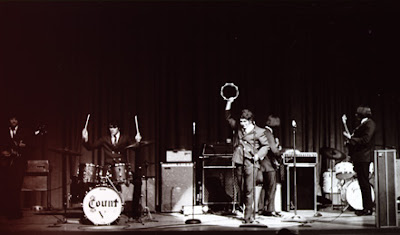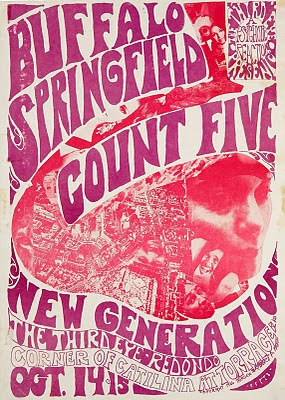Count Five - Psychotic Reaction (60s GARAGE PUNK US 1966)
 "COUNT FIVE - PSYCHOTIC REACTION" (60s GARAGE PUNK US 1966)
"COUNT FIVE - PSYCHOTIC REACTION" (60s GARAGE PUNK US 1966)"Count Five" was a 1960s Garage Rock band from San Jose, California, best known for their Top 10 single "Psychotic Reaction".
"Count Five" started life in San Jose, California, in the early '60s with a pair of high school students named "John 'Mouse' Michalski" and "Roy Chaney", who had played guitar and bass guitar, respectively, in a succession of local bands such as "Johnny & The GTOs" and "The Renegades", specializing in Surf instrumental music.
Still in their mid-teens, they changed their name to "The Squires", added a singer "Kenn Ellner", and tried picking up on the British Invasion sound; this wouldn't be the last time the group attempted to adapt to the musical sounds around them.
 Count Five: "Psychotic Reaction" / "They're Gonna Get You", 1966 Germany Hansa 19 152
Count Five: "Psychotic Reaction" / "They're Gonna Get You", 1966 Germany Hansa 19 152"Sean Byrne", an Irish-born guitarist, singer, and songwriter attending San Jose City College, came aboard in late 1964, and "The Squires" made a local name for themselves over the ensuing year.
Then, organist "Phil Evans" quit for personal reasons and drummer "Skip Cordell" joined another group; with the arrival of his replacement, "Butch Atkinson", the group changed their name to "Count Five".
It was just about then that "Sean Byrne" put the finishing touches on a song he'd been outlining in his head, ultimately called "Psychotic Reaction".
"Psychotic Reaction", an acknowledged cornerstone of Garage Rock, was initially devised by "Sean Byrne", with the group refining it and turning it into the highlight of their live sets.
"Psychotic Reaction" was released as a single, and found immediate popularity in the proto-Punk scene, peaking at #5 in the US charts in late 1966.
 "Psychotic Reaction", heard by a local DJ named "Brian Lord", became the group's key to stardom, at least momentarily.
"Psychotic Reaction", heard by a local DJ named "Brian Lord", became the group's key to stardom, at least momentarily. It became a showcase for the band's abilities, especially guitarists "John 'Mouse' Michalski" and "Sean Byrne", and they began working it up into the crescendo of their stage act.
At first it didn't seem to do much good, as the group was turned down by "Capitol Records", "Fantasy Records", and a handful of other California-based companies, but after working out a new arrangement of "Psychotic Reaction" with the band, "Brian Lord" got the song and the group placed with "Double Shot Records", a Los Angeles-based indipendent label.
The record -- a chugging, Fuzz-Tone-laden piece of Punk defiance with more than a few signature licks and phrasings borrowed from "Bo Diddley" and "The Yardbirds", among others, and a Punk attitude that was worthy of "The Standells" -- eventually made number five nationally and number one in Los Angeles.
 Unfortunately, "Count Five" was never able to follow up the hit with anything even remotely as successful.
Unfortunately, "Count Five" was never able to follow up the hit with anything even remotely as successful. An album was rushed out, containing some ill-conceived originals, but nothing that the group did after "Psychotic Reaction" seemed to work.
They tried reusing the same formula, working in a slightly more Folk-Rock vein, and attempting some fresh guitar pyrotechnics (on "The World" and "Pretty Big Mouth" and, in a Psychedelic vein, on "Peace of Mind"), plus a pair of pretty fair Who covers ("My Generation" and "Out In The Street"), but by 1967, it was clear that "Count Five"'s days were numbered.
 The strain of maintaining music careers while attending college -- which was essential to the members keeping their draft deferments -- took its toll, as did the dwindling bookings, as memory of "Psychotic Reaction" faded.
The strain of maintaining music careers while attending college -- which was essential to the members keeping their draft deferments -- took its toll, as did the dwindling bookings, as memory of "Psychotic Reaction" faded. In the end, after an attempt by "Double Shot" Records to keep "Sean Byrne" as the only active member, "Count Five" ceased to exist.
 Other notable tracks include the speedy three-chord trasher "Double Decker Bus", with its dumb as shit lyrics ("If you see me / Then you'll see us / If you don't see us / You'll see a double decker bus") and sub-"Psychotic Reaction" speedy breakdown freakout in the middle; the astonishingly weird and lovable "They're Gonna Get You"; "The Impressions"' "You Must Believe Me", a song too wonderful to ruin without putting a lot of effort into it;
Other notable tracks include the speedy three-chord trasher "Double Decker Bus", with its dumb as shit lyrics ("If you see me / Then you'll see us / If you don't see us / You'll see a double decker bus") and sub-"Psychotic Reaction" speedy breakdown freakout in the middle; the astonishingly weird and lovable "They're Gonna Get You"; "The Impressions"' "You Must Believe Me", a song too wonderful to ruin without putting a lot of effort into it; the dark Byrds Psychedelic, "Contrast" which hints that they might actually have developed into a good band had they stuck with it a little longer; and the great catchy uptempo ditty "Declaration Of Independence", which comes on like the good twin of "Psychotic Reaction" with its happy Fuzz lead lick and inevitable 'speedy breakdown freakout' in the middle.
 "Count Five" got along for about another year, but dropped out of view altogether when their only hit had fallen from public memory.
"Count Five" got along for about another year, but dropped out of view altogether when their only hit had fallen from public memory.  Another setback to a potential career in the music business was the decision of the five members (who were between the ages of 17 and 19) to pursue college degrees.
Another setback to a potential career in the music business was the decision of the five members (who were between the ages of 17 and 19) to pursue college degrees.
Subscribe to:
Post Comments
(
Atom
)









1 Comments :
sehr guter Kommentar
Post a Comment